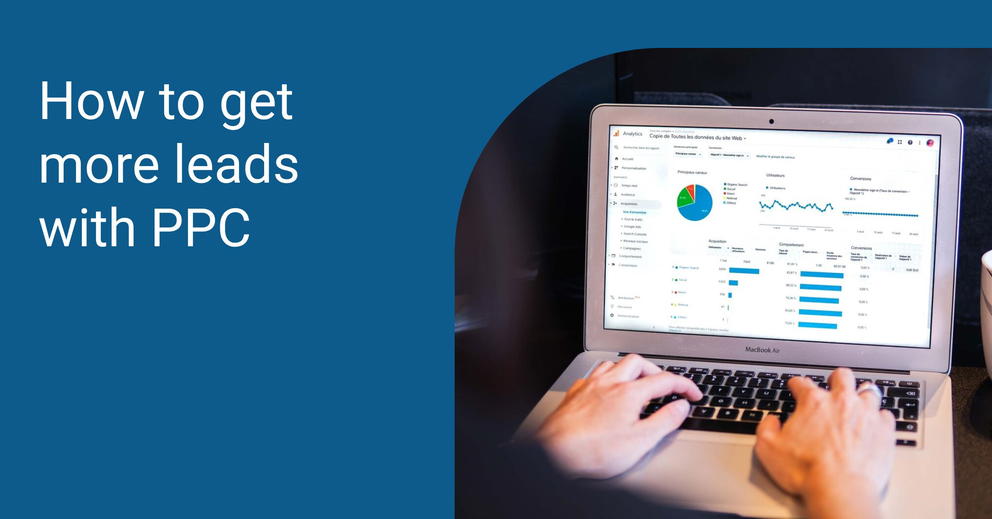PPC for Lead Generation: the right way to generate more leads
Every business relies on one form of lead generation or the other to continue operation and stay profitable. Lead generation is an integral part of many businesses, and PPC (Pay-per-click) campaigns are one of the most reliable ways to generate new leads that would potentially become paying customers.

Jan 19 2021●7 min read

In this article, you will understand what exactly PPC lead generation is and how you can use Google Ads or Bing Ads to generate more leads for your business.
This article discusses some of the key differences between B2B and B2C businesses and why these differences matter when developing an ad campaign strategy for your business.
What is PPC lead generation?
PPC used to be attributed to e-commerce businesses only. Still, in recent times, it has become clear that PPC management is a very effective lead generation channel for any website or company that relies on online lead generation and optimization. Lead generation can be inbound and outbound.
PPC is an advertising channel that you pay for by the click. With PPC, you can easily appear on page one and be found by people that need the services provided by your business.
Research has shown that Pay-per-click advertising and social media marketing are the top digital marketing tools that are the most effective for lead generation for B2B and B2C industries.
The marketing funnel of every B2B marketing funnel starts with leads. Therefore, before you can begin to convince a potential customer to do business with you, they need to be aware of your business and what you can do for them.
For the most part, you must understand the difference between the PPC directed towards B2B businesses and the one directed towards B2C businesses.
Differences between B2B and B2C PPC strategies
While it is true that both B2B and B2C customers deal with humans at the end of the day, their methods of business transactions are different in several ways. By choosing to optimize your PPC campaign for a B2B or a B2C market, you are significantly increasing your lead generation potential.
Here are some key differences between the PPC campaign for B2B and B2C companies:
- B2B requires more expensive and sophisticated PPC strategies than B2C companies
- B2B require a longer sale cycle
- The products and services of B2B businesses are more complicated
- There is no need to hard-sell in B2B. PPC lead generation strategies aim to allow buyers to purchase products and services with attention, interest, desire, and action.
The Relevance of PPC lead generation to your business
- PPC campaigns help to attract visitors who are already interested in the services or products that you offer.
- PPC helps to achieve immediate keyword rankings and boost traffic to your website.
- Precise control over the funneling process and track the activities of potential customers involved in the funneling process.
- Easily track the ROI of your PPC campaigns and grow the database of your generated leads while also marketing your business with other methods.
While both e-commerce and lead generation use PPC marketing strategies, a major difference is that e-commerce does not require any specific target market. E-commerce relies on a larger customer base, therefore, reducing the need for precise customizations.
Some of the major differences include the use of different call-to-action and messages. While e-commerce businesses use terms like “order today,” “buy now,” and “shop,” lead-gen companies rely on terms like “sign up,” “get more information,” and “attend our free webinar.”
How do you generate leads through PPC?
Here are some of the strategies used to generate new leads with PPC campaigns:
Target the right audience
The power of PPC lead generation lies in its ability to be used to target the right audience. PPC ad placement requires that you pay for every click that is initiated on your ad. However, you don’t want your ad to be clicked by just anyone. The idea is to get your PPC ads in front of your target audience specifically.
The only way to ensure that your target audience sees your ad is by taking the time to figure out who your target audience is and figuring out their online habits. You can optimize your audience reach by limiting the sites that your ads show up on in the display network based on the preference of your audience. You can also choose what social media sites to prioritize your ads for. With proper research, you can easily take advantage of the right search engine optimization (SEO) words.
Set up proper tracking data for your PPC campaigns
Tracking is an essential part of PPC lead generation. In digital marketing campaigns, it is essential to gather data during the course of the ad campaign to ensure that you have an understanding of what works and what doesn’t according to lead generation KPIs.
Analytics on PPC reporting platforms can automatically generate tracking data that makes it easy for you to analyze the success of your PPC campaign.
There are several ways of tracking your PPC data.
- Conversion tracking
- Dynamic number insertion (DNI)
- UTM tracking
You can make sure that you manage your customers in the right way by combining effective tracking with a customer relationship management (CRM) tool. HubSpot is a good CRM tool that can establish the relationship between PPC ads and eventual sales conversion.
Be specific with your ad campaigns and ad groups
B2B companies have multiple audiences with varying priorities and interests. Therefore, it makes sense to use ad groups to target the right customer base with your ads for high lead generation. Some of the typical factors that you can set your ad campaigns on include target industry, product/service, location, and competition/ brand.
By limit your PPC audience and using ad groups, you can be sure that your ad will bring precise relevance to keywords that your ad models are aimed at. Your ad copy and landing pages will be visited by people most likely very interested in your services or products. Lead generation with high relevance factors is likely to get higher click-through rates and conversions.
Establish unique landing pages for each ad group
Many businesses still don’t take advantage of landing pages and instead direct their potential leads to the homepage of their websites, a technique that is likely to earn low conversion rates. To optimize your PPC lead generation campaign, you need to have not just persuasive ads but also informative landing pages that match what your potential customers seek.
The idea is to design landing pages that match the ads that your potential customers clicked on promised. Every landing page needs to be relevant to the keywords in the ad campaign and your targeted audience.
Every landing page is designed with the intent of converting a high number of leads. Your landing page should be devoid of any distraction and only focus on the information that your potential customers need and a call-to-action.
According to the new guidelines released by Google, long-form content landing pages are not preferred to short landing pages.
Here is a summary of Google’s guideline for a landing page:
- Your landing page should be at least 500 - 600 words long.
- The keyword should be contained in the header, title, and the rest of the copy.
- A paragraph containing important information about the company like policies, warranties, return policies, and more should be included on your landing page.
- There should be texts or content telling the user why they should trust your services or company.
Take advantage of instant forms in your ads
Many users prefer not to switch platforms when they surf the internet. Therefore, an ad that causes them to switch platforms might be an unattractive option. However, platforms like Facebook and LinkedIn allow you to add a form to your ad. Therefore, allowing your potential to convert without leaving their current page. This option enhances your ability to generate leads with your PPC campaigns. Including a form in your ad can lead to the generation of high-quality leads.
Optimize what your offer to your potential customers
Everyone is after the things that are beneficial to them. With your PPC lead-gen ads, you need to offer your potential customers compelling value. This is especially important if your ad is generated based on competitive keywords and ad placements. Techniques like offering a free trial of your product or attractive discounts are good incentives for attracting customers.
Understand the importance of Negative Keywords
While you need to know the right keywords to target, it is just as important for you to know the keywords to avoid when generating PPC leads. This is because since you pay for every click made on your ad, you don’t want your audience clicking on your ad for the wrong keywords, only to get to your landing page and find out that it is not what they seek. The keywords that you don’t want in your ads are called negative keywords.
Some of the common negative keywords include words like “free” and “cheap.” This is because if you are looking for paying customers, you don’t want customers that are looking for free services and products clicking on your ads. Therefore, costing you bids and not providing any conversion.
While you can discover negative keywords through brainstorming sessions, you also want to make use of constant PPC ad analytics to discover the negative keywords for your business.
Ad extensions
The use of Ad extensions is a good way to make your PPC ad campaigns stand out. Ad extensions are used to highlight specific parts of ads that a lead might be interested in, and a good example is a signup link for a free trial or a phone number that they can call instantly.
PPC strategy testing and analysis
In the end, no one PPC strategy works for every business. Therefore, you need to experiment and continue to tweak, monitor, and analyze your ad results to ensure that your PPC lead generation campaign is well optimized. Analytics is a good way to learn more about your competitors and the right keywords for your business and you can consider using PPC Dashboard.
The best thing about the lead generation with a PPC strategy is that it allows you to run different ad versions simultaneously and compare their performances. You can take successful aspects of your PPC campaign and apply them to your email strategies. Headlines that work best for your ads will probably work well as email subject lines.
You can generate more leads by prioritizing your SEO efforts on keywords that generate the most conversion and traffic per PPC ad.
FAQs
- Is lead generation business profitable?
Lead generation can be a very lucrative business. Still, it can also be very passive if you are using organic traffic sources that are similar to those found with Google AdSense or Amazon affiliate sites. It could be more profitable to set up a deal with local business owners in your area or outside your area in other cities. Businesses may be willing to pay you a monthly retainer fee to keep the lead-gen website running and sending leads their way, or perhaps on a pay-per-lead basis.
- How do I generate Google leads?
To generate leads from Google Ads, you need to keep tweaking your ad campaigns and implementing new strategies. Experimenting with different PPC lead generation techniques, different bids, keywords, and more will help you generate Google leads.
Google Ads page has more information on generating Google leads.

WRITTEN BY
Gintaras BaltusevičiusGintaras is an experienced marketing professional who is always eager to explore the most up-to-date issues in data marketing. Having worked as an SEO manager at several companies, he's a valuable addition to the Whatagraph writers' pool.